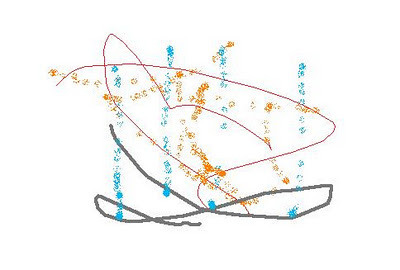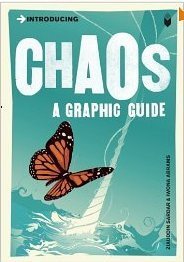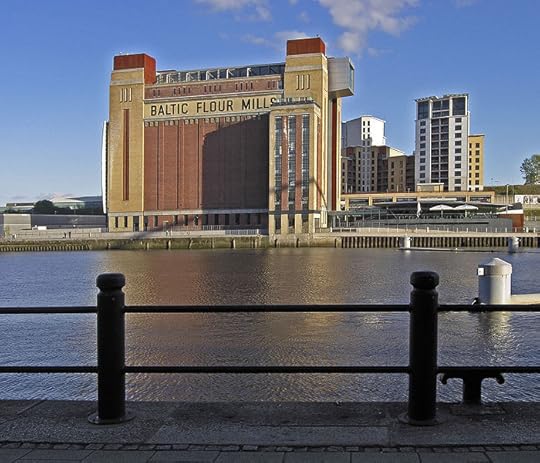Brian Clegg's Blog, page 151
December 28, 2011
Do we live a charmed life?
I am puzzled by a statistical blip. Quite a high proportion of our children's friends have parents who have split up. Not that surprising you might say. Yet when I look at our own friends, none of our close friends, and only one or two friends in the 'go for a drink occasionally, but not what you'd really call mates' category are divorced. All the rest just got married and got on with it.
The last thing I want to do by saying this is jinx things, but luckily (?) I don't believe in such superstition, magpie greeting apart. It is quite interesting, though. Does it reflect the kind of friends we seek out, the circumstances in which we meet people, a statistical outrider or a whole combination thereof? Probably. Dunno. But it's interesting to think.
And finally, as they say on the news, I gather from the excellent Mark O'Donnell on our local radio that the chimpanzee that played Cheetah in the old black and white Johnny Weismuller films has died. He was 80. I don't know why, but that's something I find interesting too.
Ain't statistics wonderful?
The last thing I want to do by saying this is jinx things, but luckily (?) I don't believe in such superstition, magpie greeting apart. It is quite interesting, though. Does it reflect the kind of friends we seek out, the circumstances in which we meet people, a statistical outrider or a whole combination thereof? Probably. Dunno. But it's interesting to think.
And finally, as they say on the news, I gather from the excellent Mark O'Donnell on our local radio that the chimpanzee that played Cheetah in the old black and white Johnny Weismuller films has died. He was 80. I don't know why, but that's something I find interesting too.
Ain't statistics wonderful?
Published on December 28, 2011 12:10
December 27, 2011
In praise of girls and women
Although the title of this post could be general, I had something specific in mind - cathedral choirs. This time of year we get more than usual exposure to cathedral choirs and their college equivalents, and they look as if they're preserved in aspic. But recently there has been a small revolution which I heartily welcome.
Traditionally such choirs have been all male, with boys taking the top treble part. There are choirs with women at a good few of the cathedrals, but they tend to be a separate, 'second league' choir. Some believe that boys and men provide the best sound there is. There's even an organization dedicated to preserving the traditional cathedral choir. But I think it's a load of tosh, which is why I very much welcome the fact we're seeing the occasional female singer joining first rank choirs.
What the anti-women brigade argue is that women's voices don't have the same clear purity as a boy's. And actually, on the whole this is true. In part this is because most good female singers will have been trained by a wannabe opera singer and will have had vibrato introduced, which is all wrong for a cathedral choir (take note, Oxford). And in part this is because women's voices do break, just less obviously than men's - and women don't have the same sound as boys (or girls).
However I think there are two ways we can and should see mixed choirs flourishing. One is that the boys should be joined by girls, with the same age limits. I defy anyone to do a blind test between well-trained boys and girls of the same age and tell which is which, as long as there is an age cutoff. Younger girls also have that clear purity. And the other aspect is that I think we are long overdue replacing male altos with women.
Cathedral choirs traditionally use male altos. I'm not biassed against them - I was one for a while. But their tone is very harsh. They work well in medieval music, but for practically everything else a female alto (provided she doesn't have too much vibrato) has a much better, blending tone. So I not only think we should allow women to sing alto, but we ought over time to replace all male altos. Sorry guys.
With these changes cathedral music would be significantly better. Then all we have to do is work on the FA/FIFA to allow football teams to be mixed...
Traditionally such choirs have been all male, with boys taking the top treble part. There are choirs with women at a good few of the cathedrals, but they tend to be a separate, 'second league' choir. Some believe that boys and men provide the best sound there is. There's even an organization dedicated to preserving the traditional cathedral choir. But I think it's a load of tosh, which is why I very much welcome the fact we're seeing the occasional female singer joining first rank choirs.
What the anti-women brigade argue is that women's voices don't have the same clear purity as a boy's. And actually, on the whole this is true. In part this is because most good female singers will have been trained by a wannabe opera singer and will have had vibrato introduced, which is all wrong for a cathedral choir (take note, Oxford). And in part this is because women's voices do break, just less obviously than men's - and women don't have the same sound as boys (or girls).
However I think there are two ways we can and should see mixed choirs flourishing. One is that the boys should be joined by girls, with the same age limits. I defy anyone to do a blind test between well-trained boys and girls of the same age and tell which is which, as long as there is an age cutoff. Younger girls also have that clear purity. And the other aspect is that I think we are long overdue replacing male altos with women.
Cathedral choirs traditionally use male altos. I'm not biassed against them - I was one for a while. But their tone is very harsh. They work well in medieval music, but for practically everything else a female alto (provided she doesn't have too much vibrato) has a much better, blending tone. So I not only think we should allow women to sing alto, but we ought over time to replace all male altos. Sorry guys.
With these changes cathedral music would be significantly better. Then all we have to do is work on the FA/FIFA to allow football teams to be mixed...
Published on December 27, 2011 11:33
December 23, 2011
I don't know much about art... but I ought to
 'LOOK WHAT THE DOG DID' Pixels on screen
'LOOK WHAT THE DOG DID' Pixels on screenBrian Clegg - 2011
Although I earn my living as a writer I see this more as a craft than an art. I'm afraid I'm a bit of a philistine when it comes to the arts. Not that I don't appreciate music or painting - I just don't understand why it needs to be subsidised. But really when you look at the letters after my name, I ought to know what I'm on about.
I very rarely use these - who does these days? But technically my name should be followed by M.A., M.A., F.R.S.A. Three sets of letters - and every one of these has an 'A' for art.
In the first place I'm a Master of Arts in the original sense of being a 'magister artis'. There are those who moan about the fact that Oxford and Cambridge graduates only have to sit around for a few years and not go to gaol (I think the Oxford lot have to pay as well) to have their B.A. transform into an M.A. - but this misses the point. That's how it's meant to be. After all, these two establishments started the whole university business in the UK. A magister is someone who can teach - the idea is that after a few years you have gained the experience to be able to pass on the subject.
That first M.A. is in natural sciences. Why a master of arts for a science degree? Because 'art' didn't orginally mean just painting and such. It was the work of man as opposed to the work of God. So everything other than theology was arts. The second M.A. is in Operational Research, effectively applied maths. But at least it's a masters in the modern sense.
And then I'm a fellow of what many would call the Royal Society of Arts - but the clue as to why I'm there is the full title: The Royal Society for the Encouragement of Arts, Manufactures and Commerce. Aha. Yes, I'm from the common end of the title.
So there you go. I may not know much about arts, but the letters after my name don't agree.
Published on December 23, 2011 14:27
December 22, 2011
Colour me yellow
 It's Royal Society of Chemistry podcast time again.
It's Royal Society of Chemistry podcast time again.I had quite a lot of fun with this one, which has had the biggest response on Twitter of any podcast I've done. It's about the dye tartrazine. Chemically it's one of the azo dyes, which are by far the most commonly used dyes, but of course it also has its controversy as a food colouring, which is why I got the Twitter flood.
Unfortunately, perhaps, the RSC did a slightly flippant tweet about it saying Tartrazine might send kids crazy, but it's definitely a pretty colour - now if you actually listen to the podcast I was a lot more measured about its potential effects, but this introduction was enough not only to get significantly retweeted but also to cause the wroth of one individual who posted 7 tweets mostly along the lines of 'Ever read Nerves In Collision by Walter C. Alvarez, M.D. about the many epilepsies?' Well no, Mr Wild (with excellent nominative determinism that really seems to be what he's called), I haven't.
I don't know about anyone else but as soon as someone puts 'M. D.' after the name on a book spine I think that they're either a boy called Doogie Howser or they are not exactly producing scientific fact. Sadly most of Mr Wild's academic references were to a Yahoo group, which doesn't exactly raise confidence either. I knew E numbers caused concern, but I hadn't realized how knee-jerk the reaction would be.
However, the mini-tweetstorm isn't the subject of this post, it's tartrazine - so why not take a listen and see if Mr Wild was right?
Published on December 22, 2011 09:20
December 21, 2011
E books can get physical
 A book selling online recentlyI see from a YouGov survey, via a report in the Bookseller than books - real, solid paper books - are 'among the most popular online buys.'
A book selling online recentlyI see from a YouGov survey, via a report in the Bookseller than books - real, solid paper books - are 'among the most popular online buys.'I must admit, I don't find the results of the survey particularly surprising. For example we are told that customers are 'likely to use a different retailer for electronic and bricks and mortar shopping' - well, yes. It's not exactly a surprise, for example, that a lot of people buy online from Amazon and don't on the high street for obvious reasons. (Amazon really ought to buy out Argos - it would be a great fit.) Similarly, my daughters buy quite a lot of clothes online from retailers like Urban Outfitters and Abercrombie & Fitch that don't have stores in our town, so it's not surprisingly that they rarely visit these shops in the brick and mortar form.
As an aside, just as the next generation has a different view of electronic communications to us oldies, they also buy remotely in a different way. If I buy stuff online, it's stuff I want. I may occasionally send it back if there's something wrong with it, but otherwise I keep it. They will buy a bunch of clothes with the intent of sending up to 50% of it back. They regard online shopping more as a visit to a changing room than a visit to the till. (In this regard, BOO HISS to Urban Outfitters, which is about the only online shop that doesn't pay the postage on returns. So guess which mug does.)
But my main theme was the observation that books are amongst the most popular online buys. This makes a lot of sense. I know it's lovely to browse through a bookshop and thumb through books (though it is less pleasant then buying some of those thumbed-through books - some of the stock on the shelves is in terrible condition). But a lot of book purchases are either a gift or another book from an author you already know and trust. It's an ideal type of product to buy online. (And it's the right shape to post.) And long may people continue to buy this way - as well as through traditional bookshops.
I love a good bookshop, but I'm not one of those book police types who think if you don't buy from their favourite little indie store you are a philistine. I just want people to buy books!
Published on December 21, 2011 10:54
December 20, 2011
Christmas slow-down
As happens every year, I'm afraid blog posting is going to get rather erratic over the next couple of weeks. Many apologies - but I will try to appear as often as time is available. The trouble is, with the dual requirements to
a) Rush around the house like mad clearing up because 'Someone* is coming round.' and
b) Indulge in far too much eating and drinking and watching TV that would be painful the rest of the year but is somehow right at the festive time
there really isn't enough time to blog as well.
So, in honour of my choir, which did an excellent job of the carol service on Sunday, I'll leave you with one of my favourite carols instead (this, incidentally isn't my choir):
* Not a euphemism for Santa Claus or Father Christmas. Just someone.
a) Rush around the house like mad clearing up because 'Someone* is coming round.' and
b) Indulge in far too much eating and drinking and watching TV that would be painful the rest of the year but is somehow right at the festive time
there really isn't enough time to blog as well.
So, in honour of my choir, which did an excellent job of the carol service on Sunday, I'll leave you with one of my favourite carols instead (this, incidentally isn't my choir):
* Not a euphemism for Santa Claus or Father Christmas. Just someone.
Published on December 20, 2011 14:37
December 19, 2011
Science jokes bode well
 There's been quite a lot of physics in the news lately, what with the faster than light (ish) neutrinos and the possibility of a sighting of the Higgs boson (not to mention a rumoured sighting of Brian Cox). It's rather nice - it even makes up for the BBC's nautical version of the goings on at CERN, repeatedly calling the elusive particle a Higgs bosun. (It's named after a guy called Bose, folks. Get with the plot.)
There's been quite a lot of physics in the news lately, what with the faster than light (ish) neutrinos and the possibility of a sighting of the Higgs boson (not to mention a rumoured sighting of Brian Cox). It's rather nice - it even makes up for the BBC's nautical version of the goings on at CERN, repeatedly calling the elusive particle a Higgs bosun. (It's named after a guy called Bose, folks. Get with the plot.)A very welcome sign of the interface between physics and the real world are the physics jokes doing the rounds, no longer confined to geeks and nerds.
You will all have seen (ad nauseam) A barman says 'We'll have no faster than light particles in here.'
A neutrino walked into a bar.
... But how about (via Calum Scott) this?: Argon walked into a bar. The barman says 'We don't serve noble gasses.' Argon doesn't react..
And thanks to Mark O'Donnell at BBC Wiltshire for this cracker: A Higgs boson goes into a church on Christmas Eve but the vicar says: 'Sorry, we don't allow Higgs bosons into our service.' The Higgs boson replies: 'But how else are you going to have Mass?'
All in all excellent stuff, though I have to say there's a lot of exclusion going on in these jokes...
Published on December 19, 2011 13:48
December 16, 2011
Off the shelf makes sense
 A shelf something could easily be got offWe hear in the news that our military has wasted around £1 billion failing to come up with an armoured vehicle so had to buy off the shelf. That piece instantly transported me back to my days at British Airways.
A shelf something could easily be got offWe hear in the news that our military has wasted around £1 billion failing to come up with an armoured vehicle so had to buy off the shelf. That piece instantly transported me back to my days at British Airways.We got involved in an EU project to design a better check-in system. Great idea - check-in systems were incredibly fast, but had a terrible user interface. We went through months and thousands of pieces of paper in the set up process and finally got to the first real stage. And the Euro-powers-that-were told us the first thing we needed to do was design a computer terminal. From scratch. So that we had the best equipment for the job. We pulled out. If you want a way of interacting with a computer you grab a PC of the shelf. To design such hardware from scratch was ludicrous.
Firstly it would have been extremely expensive. I think the cost per unit was four or five times that of an off-the-shelf PC. Secondly all this time, effort and money could at best produce maybe a five percent enhancement in terms of matching our exact requirements. And most important of all, that 'at best' was never going to happen. The fact is that after years of deliberation by committee we would end up with a worst of all worlds device that was worse than the PC was back when we first started, let alone today's model.
Of course there are circumstances when off-the-shelf isn't the answer. But my experience with BA and other organizations (particularly public ones, or ex-public ones) is that many people have a ridiculously strong urge to build something bespoke that provides nowhere near the benefits that would be needed to outweigh the vast increase in cost over off-the-shelf. It wastes time, it wastes effort and very often you end up with something worse. My suspicion is that this is true of most MoD purchasing.
Now, time for my cup of coffee. Should I use an off-the-shelf kettle, or design something myself that will end up taking three months to build, will cost £527.47 and will start leaking after two weeks use. Hmm. Difficult one. Better get a committee together...
Published on December 16, 2011 09:30
December 15, 2011
Get drawn into a book
 Another of the books in the seriesWe all like the feeling of being immersed in a book that we're reading. You could say that you get drawn into the book. Now there's a chance to have this happen literally.
Another of the books in the seriesWe all like the feeling of being immersed in a book that we're reading. You could say that you get drawn into the book. Now there's a chance to have this happen literally.It's a rather fun idea from my UK publisher Icon. They produce the pocket-sized 'Introducing, a graphic guide' books, which combine punchy text with artist-created illustrations. You can see the kind of thing in this sneak peak of Introducing Relativity, though I have to say that the illustrations in the new book are much crisper and better drawn than these appear to be in the sample. Icon is running a competition to get a cameo role by being drawn in a new book by a well known popular science author (ahem), Introducing Infinity. So the winner will have themselves drawn as one of the figures in an image illustrating one of the pages.
To enter all you have to do is summarize a topic that the Introducing series covers in 100 characters in a tweet which contains both the hashtag #beinabook and the link http://tinyurl.com/bpal8od (that's just a link to their competition page). Simples, as all the best meerkats say. The closing date is 5pm GMT on Thursday 5th January 2012. The winner (judged most amusing and accurate by Icon Editorial Director Duncan Heath and me - sadly bribes are not allowed) appears in the book, while the 25 runners up get a free copy of an Introducing book.
That should be enough to enter, but to find out more see Icon's page on the competition, and to see the range of topics, here's a list of their books.
Published on December 15, 2011 08:40
December 14, 2011
Turner tat
 They thought if they did it in Gateshead no one would noticeLast week was Turner Prize time again (sorry for the delay in commenting on this, but another artform,
Playboy
, seems to have got in the way). Yes, it was that annual opportunity for those who have the suspicion that much of the arts is pretentious claptrap to have a field day.
They thought if they did it in Gateshead no one would noticeLast week was Turner Prize time again (sorry for the delay in commenting on this, but another artform,
Playboy
, seems to have got in the way). Yes, it was that annual opportunity for those who have the suspicion that much of the arts is pretentious claptrap to have a field day. The slightly surprising discovery was that I really liked Martin Boyce's winning exhibit Do Words Have Voices. Admittedly I haven't seen it for real, but from what I've seen in photos/ on the TV it is very impressive, and certainly no pile of bricks or dirty bed.
However the arts community can't yet emerge from its bunker grinning with relief. ('I say, Brian Clegg liked it. Can you believe it? Now we can have a happy Christmas!') Because I still heard a load of posing garbage spouted about it on the TV and radio.
What particularly got me was the way the arty types were saying of various entries (including the winner) 'Of course, only those in the know will appreciate this.' Apparently you have to be one of the cognoscenti to get anything out of these 'art works' because understanding them is all about spotting subtle references. If that is true, then what we are dealing with is not art, it's an in-joke. The whole point of art is to communicate. If the art doesn't do that unless you get the in-jokes, it's crap art. End of.
Picture from Wikipedia
Published on December 14, 2011 08:32



